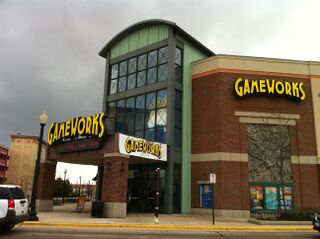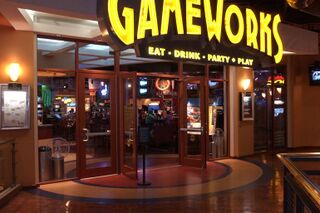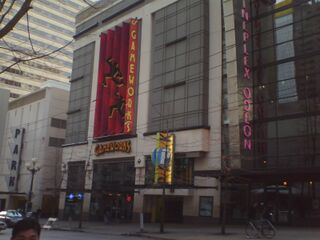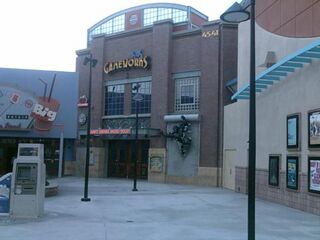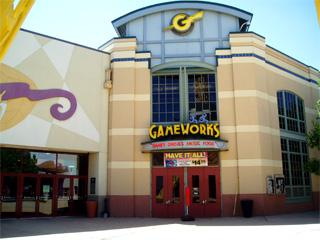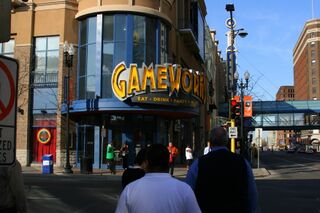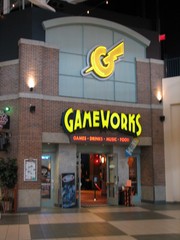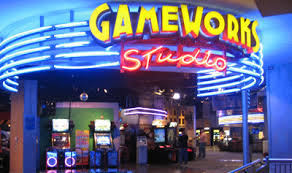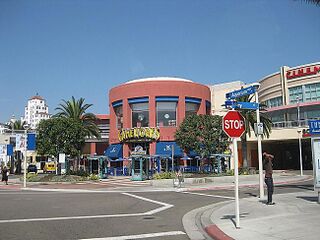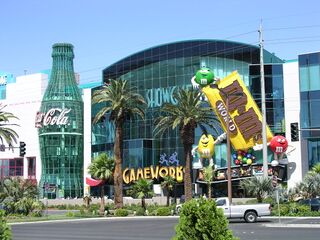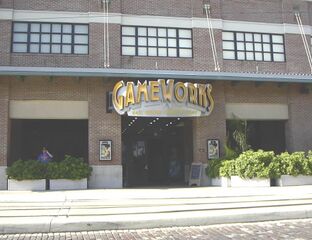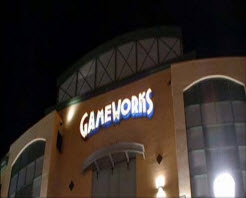GameWorks
From Sega Retro
GameWorks is a chain of entertainment venues featuring arcade games, simulators, and full-service bars and restaurants. It was created in 1996 as a joint venture between Sega, Universal Studios, and DreamWorks SKG. GameWorks venues began opening across the United States in 1997, replacing the Sega City arcades as the United States' modified version of Sega's Amusement Theme Park concept.
As of 2011, GameWorks is no longer owned or operated by Sega, with the majority of original venues now permanently closed.
Contents
Operations
GameWorks venues are best described as what are now known to the amusement industry as urban entertainment centers, combining arcade games, a small number of Mid-size attractions, and full-service food & drink outlets in an urban/inner-city setting. Though many are of a size significantly larger than common amusement arcades, the centers are usually not comparable to the indoor theme parks that Sega created in other countries around the same time - most have not charged admission fees for entrants, or housed Large attractions developed by the company, and instead have attempted to cater more to a North American market, where chains like Dave & Busters are popular.
Nonetheless, because of their former association with Sega, GameWorks centers were (and still are) home to many of their products and games, as well as examples manufactured by other companies. Games housed in the venues have ranged from older classics to newer simulators, and have included a select number of Mid-size attractions developed by the company, including The Lost World: Jurassic Park Special. Some locations have also have been used as location test sites for Sega, something likely reflected in Daytona USA 2: Battle on the Edge in particular by the inclusion of a large GameWorks logo in one of its racetracks.
Larger locations would often contain elaborate media and gaming-themed décor, as well as dedicated areas for specific subsets of machines; these were made known to visitors by the inclusion of further theming, including full-size model cars for racing games. Recent years have seen bigger focuses on prize redemption in an attempt to adapt to the larger popularity of them in the current amusement market, as well as newer revisions of its former Play Card payment system, utilising pre-paid rewriteable cards for game credits.
A central part of GameWorks operations that differentiate them from other amusement spaces created by Sega is the inclusion of bars and restaurants, such to the extent that one location, the former Tuscon, Arizona venue, later reopened under Sega as World Sports Grille, placing significant emphasis on its hospitality aspect. Restaurants trading within the centers serve family-friendly food; bars are typically sports bars, with licences to serve alcohol and broadcast sporting events.
Like Sega's other indoor amusement venues, Sonic the Hedgehog was the mascot of GameWorks until the 2011 sale of the venues, and was featured on the chain's merchandise, redemption prizes, children's menus, party decorations, and as a costumed character.
History
Background
In the early 1990s, Sega's worldwide expansion plans for their amusement operations were mapped out after a slew of successful openings in Japan under the shortlived En-Joint concept. Venues in the United States, a country in which the Sega brand was getting more recogntion, were pre-requisite; the company had operated numerous amusement arcades and entertainment centers in the region before, such as the Sega Centers, P.J. Pizzazz, and Time-Out, however these were all either closed or owned by other companies by the time of 1991.
In 1992, a number of small-scale test venues were opened in several countries outside of Japan through new agreements with regional distributors, including the United Kingdom's Metropolis in the basement of the London Hamley's branch,[1] an officially supplied arcade located within Euro Disney in France,[2] and a temporary installation in Spain for the 1992 Summer Olympic Games.[3] In the case of the United States, which saw the pre-existing Sega Enterprises Inc. USA return to arcade operations, this began with the Game City[4] arcade in Scotty's Golf Park, Dallas, Texas.[5]
Moving into 1993, Sega began putting infrastructure in place for the launch of its first indoor theme parks the following year, which after debuting in Japan, were planned to open across the world, making for a tentative total of 100 by the end of the decade.[6] During May of that year, Sega World Hakkeijima Carnival House opened in Yokohama's Hakkeijima Sea Paradise aquarium park, containing AS-1 and Virtua Formula installations.[7] Mirroring this, Sega VirtuaLand opened in the Luxor Hotel, Las Vegas, with the same two attractions, a pair of R360 simulators, and a comparable floor space in October.[8]
By the following year, Sega's Amusement Theme Park concept had been initiated with Osaka ATC Galbo and Yokohama Joypolis in Japan. 1994 did not see any new openings of venues in the States, however Sega had entered high-level negotiations with entertainment giants Disney and Universal/MCA. The initial result of the former was the company's console and arcade exhibition at Innoventions and future plans for other jointly-developed theme park locations, while the latter was going to tentatively lead to Sega's first overseas indoor theme park in the CityWalk complex in 1995.[9][10]
Development
GameWorks' first roots can be traced back to Sega's original partnerships with Universal and Disney. Though beneficial in theory, both had fundamental problems; the latter particularly was not without its caveats, as Sega themselves had hopeful aspirations to rival Disney by the end of the decade.[6] As a result, both negotiations broke down, with the announced CityWalk facility never materialising, Disney borrowing ideas for the DisneyQuest scheme, and the first overseas Sega theme park location eventually becoming SegaWorld London in 1996.
Undeterred, Sega continued its expansion plans, despite already experiencing setbacks. Gains were made with the launch of the Sega City chain of arcades, and talks continued with Universal to look at alternative avenues. DreamWorks SKG, recently founded in 1994 by Steven Spielberg, David Geffen, and former Disney chairman Jeffrey Katzenberg, had also became involved, with the companies announcing their first agreement in September 1995.[11] Katzenberg, Spielberg, and MCA CEO Skip Paul visited Sega's AM R&D offices in Japan during January 1996, meeting with numerous developers and Hayao Nakayama.[12]
Instead of the original indoor theme park model, which had proven problematic to get off the ground in the States, a new chain of urban entertainment centres was envisaged by the three companies, combining manageable aspects of the overseas Amusement Theme Park concept with new attractions specifically made for American audiences, and a larger emphasis on food and drink outlets. The retooling was likely undertaken to appeal to a market increasingly receptive to the Dave & Busters chain of venues, which followed a similar ethos.
The GameWorks venture was formally named and announced by Sega, DreamWorks, and MCA in April 1996.[13] Sega indicated its original plans for indoor theme parks in the States would not happen, and that GameWorks would be the name used for the entertainment centers it planned to open alongside the new jointly funded company, which additionally planned to take over from Sega Enterprises Inc. USA to distribute Sega's arcade machines in North America.[13] Under Sega GameWorks L.L.C., Steven Spielberg led a team of engineers and developers, creating new mini theme park attractions.
Launch
The first GameWorks was created by Steven Spielberg and opened in Downtown Seattle in March,[14] 1997 to much fanfare.[15] A typical facility cost about $10 million or more to build, and plans initially called for up to 150 locations.
Demise
After earnings of the first stores proved disappointing, the scope of the chain was scaled back significantly. Nonetheless, Sega estimated that at its height, the 18 U.S. locations that existed drew in over 15 million guests per year. Smaller venues which lacked the bar and restaurant aspect of the chain were titled GameWorks Studios and were usually placed in shopping malls.
Due to the costs involved in the venture, DreamWorks SKG withdrew their involvement in 2001, and the chain itself filed for bankruptcy in 2004. NBC Universal's stake in GameWorks was sold to Sega Sammy Holdings on November 3, 2005, making it wholly-owned by SEGA and was operated by its subsidiary, Sega Entertainment USA until May 2011.
GameWorks began to further struggle financially in the late 2000s as a result of an economic downturn in the United States. As part of a major restructuring move, Sega Entertainment USA suddenly closed down seven GameWorks venues on March 29, 2010, in an attempt to focus the chain's mission on profitability and future growth. Sega Entertainment USA reported that as a result of the closure, GameWorks employees at the closed locations lost their jobs, although some received 30 days of wages. The ten remaining locations and the World Sports Grille in Tucson were to become the focus of renewed efforts going forward.
In May 2011, Sega sold GameWorks, which now consisted of only seven locations, to an investor group headed by theme park and arcade chain veteran Steve Dooner. Now known as Gameworks Entertainment LLC, the company has moved its headquarters from the Chicago suburbs to Las Vegas. Dooner, GameWorks' new chief executive, said he originally tried to buy Gameworks in 2001 and discussed the possibilities of making the acquisition a second time in 2004 before the chain was declared bankrupt. His third and successful round of negotiations with Sega began in January 2010.
Dooner planned to revitalize GameWorks by making broad changes to technology, menus and marketing, increasing the company's emphasis on social media, and eventually opening new locations. Though the franchise is no longer affiliated with Sega, some theming and redemption prizes are still based off of Sega game franchises. Today, only 6 of the GameWorks locations SEGA opened are still in business.
Locations
(Note: this does not include locations post Sega's 2011 sale)
United States
Schaumburg, Illinois (with The House of the Dead 4 Special, Street Fighter IV arcade machines and new Stern pinball games on test)
Tucson, Arizona (GameWorks Studio) (reopened as World Sports Grille in 2008, also operated by Sega)
International
New York City Center Entertainment Complex[16], Rio de Janeiro, Brazil (Opened November 1999[16]. Despite being a very successful location, constantly full, it was closed due to disagreements with the local representative. They wanted to remove the restaurant, and only keep the 2 bars. The Brazilian company created its own arcade brand, called HotZone.)
Marina Mall, Salmiya, Gulf Street, Kuwait (opened in July 2003)[17]
Locations never built
- Milwaukee, Wisconsin (struck down in the Pabst City project vote)
- Westbury, New York (though a sign outside the Source mall touted its arrival, it never materialized; instead, 'Jillians' took over the location which is now Dave & Busters)
- Harrisburg, Pennsylvania (building built in Harrisburg Mall but the project was abandoned in the wake of the financial crisis of 2007–2010)
Videos
External links
References
- ↑ Computer & Video Games, "January 1993" (UK; 1992-12-15), page 12
- ↑ https://www.lesechos.fr/1992/03/sega-rachete-le-francais-w-dk-921897 (Wayback Machine: 2021-05-30 15:16)
- ↑ File:UltimaGeneracion ES 05.pdf, page 108
- ↑ https://www.ebay.co.uk/itm/124149399534 (Wayback Machine: 2021-05-29 23:15)
- ↑ Electronic Games (1992-1995), "December 1992" (US; 1992-11-10), page 11
- ↑ 6.0 6.1 Press release: 1993-07-04:Sega Takes Aim at Disney's World
- ↑ Beep! MegaDrive, "July 1993" (JP; 1993-06-08), page 35
- ↑ GamePro, "December 1993" (US; 1993-xx-xx), page 287
- ↑ https://techmonitor.ai/technology/sega_and_matsushita_subsidiary_in_theme_park_venture (Wayback Machine: 2021-05-29 23:52)
- ↑ File:Amusement Theme Park JP Booklet.pdf
- ↑ Game Machine, "1995-11-01" (JP; 1995-11-01), page 14
- ↑ @MegaDriveShock on Twitter (Wayback Machine: 2021-04-29 18:51)
- ↑ 13.0 13.1 Game Machine, "1996-05-01" (JP; 1996-05-01), page 14
- ↑ Press release: 1997-03-15: BECK AND COOLIO TO PERFORM AT MTV'S GameWorks PREMIERE PARTY SPECIAL LIVE FROM THE GRAND OPENING OF GameWorks SATURDAY, MARCH 15 IN SEATTLE, WA
- ↑ Press release: 1996-12-04: FIRST GameWorks PLAYS IN DOWNTOWN SEATTLE, MARCH 1997
- ↑ 16.0 16.1 16.2 16.3 http://www.gameworks.com:80/scoop/gw_locations.html (Wayback Machine: 2001-04-09 18:42)
- ↑ http://www.gameworks.com:80/scoop/gw_locations.html (Wayback Machine: 2005-12-14 09:02)

